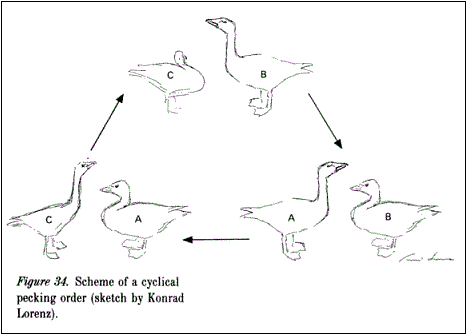Spectacularly non-obvious, 2: threeness games
[ by Charles Cameron — my own three-way play, and a little goose ethology from Konrad Lorenz ]
.
Konrad Lorenz, Paul Leyhausen, Motivation of human and animal behavior: an ethological view, p 129
**
Returning to the topic of ternary logics and scissors paper stone, here’s another old post of mine (Dec 2000):
I’ve always thought it was a training in the complete frustration of the assumption that conflict could be decided, most of all by means of skill of any kind. I mean, if you want to decide on a random basis, toss a coin, and if you want to decide on a basis of power or skill, set up a contest in which superior power or skill succeeds…
In scissors paper stone you have a setup where (as in heads and tails) no choice is superior to any other as far as chance is concerned, but there’s a troubling “threeness” about the thing which means it’s not aligned with an “either/or” logic but with a subtler logic altogether.
Two other places where this kind of “intransitivity” relation can be found would be (a) the geese studied by Konrad Lorenz which had a pecking order “a > b > c > a” (ie of the three particular geese, one would always defer to the second, which would always defer to the third, which in turn would always defer to the first) — and this is a perfectly “natural” effect which Lorenz encountered in “real life” — and (b) the impossible triangle devised by L S and R Penrose, which is clearly and unambiguously paradoxical (though logically equivalent to the Lorenz geese as far as I can tell).
Anyhow, what I’m trying to suggest is that “scissors paper stone” can work a little like a koan, it can somehow challenge our usual binary asusmptions and train us in a more flexible and “lateral” way of thinking..
**
Some thoughts about a game (real or agent-based) in which three players (or sides) compete, two teaming up against one in constantly different configurations of challenge and victory (June 2005):
The idea is simplicity itself, putting it into words unambiguously is difficult.
Yesterday I was at a hotel swimming pool where two sons of another guest and my own son Emlyn were playing around together, all aged around 10-12, with nobody else there, and I asked them to play a game where one of the three would be “top guy” and the other two would try to dunk and generally overthrow him, and as soon as it became clear that the top guy had been dunked and dethroned, there would be a new “top guy” (one of the two who had been doing the overthrowing and come out the obvious winner) and the other two would pounce on him…
They were not evenly matched, but any one of them was easily outmatched by the other two working together, and being “top guy” meant your head was above water and you were, so to speak, “comfortable” — so there was a real premium on being “top guy”, and the other two were (at any time) eager to collaborate to get the position.
And there was no tendency for the two brothers to gang up against my son, because the immediacy of two defeating one was more urgent and compelling than any ideas of teaming by kinship interests, minor differences in strength and skill, etc…
More:
Prisoners’ Dilemma deals with the essence of twoness, as do many win / lose games such as tennis or chess, and this game deals with the essence of threeness, as (in a very different mode) does paper scissors rock.
My sense from PSR, and reason for being particularly interested in threeness in games, is that PSR involves thinking in flagrant defiance of our usual binary logic as humans.
I suspect my threeness game could be paradigmatic for cooperation and competition, in that each player at any given moment is either “top guy” or “member of the opposition” — and thus plays either “sole defender” (competing without a trace of collaboration) or “team attacker” (cooperating to compete) at any give moment, but with a very rapid turnover between the two.
The kids seemed to enjoy the in-the-pool version yesterday, until it the water-play got a bit too rough after about forty minutes or an hour of enthusiastic splashing and dunking.
And finally:
As a game designer, I want to think through this mode of play, two against one with switching, in a number of media — water play, three-person tag, possible card-game instantiations, board games, a chess variant perhaps, a variant on my own HipBone Games, etc — and as a conceptual matrix for game-theorizing, modeling, understanding conflict and conflict resolution, etc.
I wonder what ideas and possible uses the basic idea might trigger in others…




October 30th, 2015 at 7:37 pm
“the way people win is by detecting sequential dependencies in the various choices that their opponent makes – so learning about the opponent over time, particularly their choices of what they’re going to field, is a very useful heuristic, is a very useful educational gesture”
.
It sounds like, and the image of the 3 components in a cycle looks like, a feedback loop.
When I think about it, I get the image of the non-linear feedback of the three body physics problem, where entities of unequal power and influence rather than equals end up grouping together.
https://en.wikipedia.org/wiki/Star_system#Hierarchical_systems
Also, brings to mind Lynn C Rees’ piece on the far powers and near powers in ‘The Arthashastra’.
This might be a better model of the global system of your “king of the pool” game instead of the actual game.